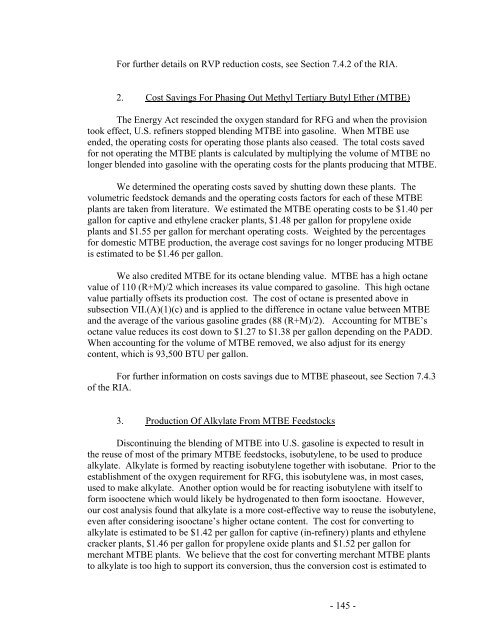Regulation of Fuels and Fuel Additives: Renewable Fuel Standard ...
Regulation of Fuels and Fuel Additives: Renewable Fuel Standard ...
Regulation of Fuels and Fuel Additives: Renewable Fuel Standard ...
Create successful ePaper yourself
Turn your PDF publications into a flip-book with our unique Google optimized e-Paper software.
For further details on RVP reduction costs, see Section 7.4.2 <strong>of</strong> the RIA.<br />
2. Cost Savings For Phasing Out Methyl Tertiary Butyl Ether (MTBE)<br />
The Energy Act rescinded the oxygen st<strong>and</strong>ard for RFG <strong>and</strong> when the provision<br />
took effect, U.S. refiners stopped blending MTBE into gasoline. When MTBE use<br />
ended, the operating costs for operating those plants also ceased. The total costs saved<br />
for not operating the MTBE plants is calculated by multiplying the volume <strong>of</strong> MTBE no<br />
longer blended into gasoline with the operating costs for the plants producing that MTBE.<br />
We determined the operating costs saved by shutting down these plants. The<br />
volumetric feedstock dem<strong>and</strong>s <strong>and</strong> the operating costs factors for each <strong>of</strong> these MTBE<br />
plants are taken from literature. We estimated the MTBE operating costs to be $1.40 per<br />
gallon for captive <strong>and</strong> ethylene cracker plants, $1.48 per gallon for propylene oxide<br />
plants <strong>and</strong> $1.55 per gallon for merchant operating costs. Weighted by the percentages<br />
for domestic MTBE production, the average cost savings for no longer producing MTBE<br />
is estimated to be $1.46 per gallon.<br />
We also credited MTBE for its octane blending value. MTBE has a high octane<br />
value <strong>of</strong> 110 (R+M)/2 which increases its value compared to gasoline. This high octane<br />
value partially <strong>of</strong>fsets its production cost. The cost <strong>of</strong> octane is presented above in<br />
subsection VII.(A)(1)(c) <strong>and</strong> is applied to the difference in octane value between MTBE<br />
<strong>and</strong> the average <strong>of</strong> the various gasoline grades (88 (R+M)/2). Accounting for MTBE’s<br />
octane value reduces its cost down to $1.27 to $1.38 per gallon depending on the PADD.<br />
When accounting for the volume <strong>of</strong> MTBE removed, we also adjust for its energy<br />
content, which is 93,500 BTU per gallon.<br />
For further information on costs savings due to MTBE phaseout, see Section 7.4.3<br />
<strong>of</strong> the RIA.<br />
3. Production Of Alkylate From MTBE Feedstocks<br />
Discontinuing the blending <strong>of</strong> MTBE into U.S. gasoline is expected to result in<br />
the reuse <strong>of</strong> most <strong>of</strong> the primary MTBE feedstocks, isobutylene, to be used to produce<br />
alkylate. Alkylate is formed by reacting isobutylene together with isobutane. Prior to the<br />
establishment <strong>of</strong> the oxygen requirement for RFG, this isobutylene was, in most cases,<br />
used to make alkylate. Another option would be for reacting isobutylene with itself to<br />
form isooctene which would likely be hydrogenated to then form isooctane. However,<br />
our cost analysis found that alkylate is a more cost-effective way to reuse the isobutylene,<br />
even after considering isooctane’s higher octane content. The cost for converting to<br />
alkylate is estimated to be $1.42 per gallon for captive (in-refinery) plants <strong>and</strong> ethylene<br />
cracker plants, $1.46 per gallon for propylene oxide plants <strong>and</strong> $1.52 per gallon for<br />
merchant MTBE plants. We believe that the cost for converting merchant MTBE plants<br />
to alkylate is too high to support its conversion, thus the conversion cost is estimated to<br />
- 145 -
















